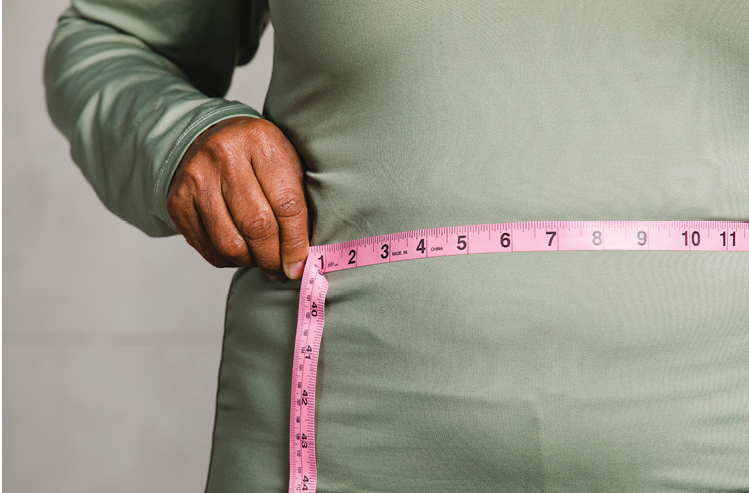Americans continue to get fatter with Black and Latino adults as well as people living in rural communities having the highest rates of obesity according to the latest report by The Trust for America’s Health, “State of Obesity 2024:
Better Policies for a Healthier America.” Obesity rates for U.S. adults were at or higher than 35 percent in 23 states in 2023, part of a multi-decade increase in the rates of Americans living with obesity. In comparison, in 2012 no state had an adult obesity rate at or above 35 percent.
Obesity leads to a variety of physical and mental health issues, increased mortality rates, elevated healthcare expenses, and reduced productivity are linked to obesity and other diet-related illnesses.
In 2023, the states with the highest adult obesity percentages were West Virginia (41.2 percent), Mississippi (40.1 percent), Arkansas (40.0 percent), Louisiana (39.9 percent), and Alabama (39.2 percent).

From 2022 to 2023, adult obesity rates significantly increased statistically in three states: Alaska, Arkansas, and Oregon. No states experienced a statistically significant decrease during this period. Over five years from 2018 to 2023, 28 states have recorded significant rises in adult obesity rates.
Obesity has become such a national health crisis that many doctors are prescribing a range of diabetes drugs such as Ozempic, and Mounjaro for weight loss which was found to be a surprising side effect of treating diabetes. Further, people without diabetes have access to taking drugs specifically for weight loss like Wegovy and Zepbound.
H. Johnny, a construction worker, from Maryland is overweight, more like obese, but he’s learned to live with the shame and stigma of being called fat. At 5’10 his weight hovers around 290 and 275 on his better days. Consequently, he has Type II Diabetes and a list of other health challenges.
He’s tried different diets with little success. His doctor prescribed Ozempic and it has stabilized his blood sugar. Mr. Johnny is looking forward to the weight loss everyone is talking about.
“Ozempic is working but I’m not consistent with the weekly shots because I don’t care for the side effects. I get queasy, nauseous and often a general feeling of malaise. I don’t want to take any prescription, but I need this,” Mr. Johnny told The Final Call.

The popularity of these drugs is being promoted with commercials and advertisements but there are concerns about the side effects. An October 5, 2023, article on CNN titled, “Researchers link popular weight loss drugs to serious digestive problems for ‘hundreds of thousands’ worldwide, stated,
“A new study suggests people taking popular injected medications for weight loss, including Wegovy, Ozempic, Saxenda and Victoza, may be at higher risk for serious digestive problems such as stomach paralysis, pancreatitis, and bowel obstructions, compared with those taking other types of weight loss medications.”
Although the study cited by CNN says the side effects were “rare” with less than one percent of patients taking Ozempic, “diagnosed with stomach paralysis,” and that “demand for the drugs has exploded, with tens of millions now taking them worldwide, researchers say even rare risks like these may amount to hundreds of thousands of new cases.”
“When you have millions of people using these drugs, you know, a one percent risk still translates to many people who may experience these events,” said lead study author Dr. Mahyar Etminan, an epidemiologist at the University of British Columbia, reported cnn.com.
The study authors also note that these problems are not mild because bowel obstructions, for example, can be medical emergencies, the article stated.
While the drugs may have some success for some weight loss, Dr. Khalillah Ali who works at a Bureau of Indian Affairs hospital in Kayenta, Arizona, is concerned. “They’re putting a band-aid on a gunshot wound. These drugs are not addressing the root of the problem. People are overfed and undernourished.
Industries are making so much money, by overfeeding people with undernourished food. Now there’s a whole new industry making more money by making people obese. However, it’s not addressing the root problems of bad food. People eat junk food mindlessly often leading to obesity. It’s a big problem. But nobody wants to talk about root issues,” she told The Final Call.
“In the Nation of Islam, we were given ‘How to Eat to Live’ by the Honorable Elijah Muhammad,” she said, referring to the two-volume book by the Eternal Leader of the Nation of Islam.
“He told us to train our bodies to eat once a day. That’s hard. But we have to get back to basics. It’s very easy to start looking for quick fixes, easy fixes.” Dr. Ali stated for diabetics some weight loss drugs are effective, but she explained, “If you’re Type 2 Diabetic and obese, you should try it to get your weight down. You should make sure you’ve exhausted all other weight loss resources before drugs.”
Melanie Robertson is a non-profit manager in D.C. She has been overweight for decades and said she has tried various diets and more. “Things work for a while; I lose but I gain it back. Last summer I got tired of being fat and asked my doctor for help.” She said her doctor prescribed a drug which is for diabetes even though she is not diabetic.

“My insurance doesn’t cover it so with a discount card, I pay $550 a month,” said Ms. Robertson. She admitted the amount of money is a lot, but she is willing to pay it to lose weight and feels the prescription is working. However, she admitted she has experienced side effects. “There are side effects, indigestion and constipation. If I overeat, I get nauseous,” she said in part.
The State of Obesity 2024: “Better Policies for a Healthier America,” report analyzed the latest data from the Centers for Disease Control and Prevention’s (CDC) Behavioral Risk Factor Surveillance System.
States with the lowest levels of adult obesity in 2023 were Colorado (24.9 percent), Hawaii (26.1 percent), Massachusetts (27.4 percent), and California (27.7 percent), plus the adult obesity rate in the District of Columbia was 23.5 percent.
In the United States, more than 40 percent of adults are affected by obesity. Although obesity rates have risen across all demographic groups, the highest rates are typically observed in communities of color, which often encounter systemic obstacles to maintaining a healthy lifestyle. These barriers include limited access to affordable nutritious food and insufficient opportunities for physical activity.
The prevalence of obesity is also increasing among young people, with approximately 20 percent of American children and teenagers between the ages of two and 19 classified as obese. This represents a threefold increase since the mid-1970s. Moreover, Black and Latino youth experience significantly higher obesity rates compared to their White counterparts.
Dr. Ali recommends keeping a food journal, exercising and getting your thyroid checked, monitoring your intake of carbohydrates and having your metabolism checked.
Dr. Safiyya Shabazz, a Philadelphia family physician works with overweight Black people.
“One of the major challenges that we know is that people, particularly our people, particularly Black women struggle with managing their weight. We know as well that there’s significant health risks associated with the extra weight that we’re carrying both mental weight and the actual pounds that we are carrying.
There have been many approaches to help people reduce their weight. Most people have been unsuccessful (in) maintaining long-term weight loss,” she told The Final Call.
“We have tools today that can really help people to overcome a big barrier to them being able to achieve the important health goal of reaching a more healthy weight. However, the bulk of the Nation’s (Nation of Islam) health plan is based in ‘How to Eat to Live’ and Restrictive Law. These things with perfect execution would help us avoid most of the more common health problems,” said Dr. Shabazz.
“I thought the use of weight loss medications was a quick fix or something more of a cosmetic concern earlier in my medical training. To be honest, many of the medications that were available weren’t safe to use for a protracted time.
They provided benefit that could help people get their weight down, but we really could not connect that weight reduction to long-term health benefit or even short-term health benefits because of some of the side effects,” Dr. Shabazz continued.
“There is a thought process shift in thinking about it. For example, we treat people’s high blood pressure because we know that high blood pressure, when untreated over the years, increases the risk of heart disease, the number one killer of people.
I would argue food is the number one killer of people, and obesity not only increases the risk of most of the more common health problems such as heart disease, such as diabetes, which is a more than $30 billion problem.”
She added, “I think that it makes so much more sense to treat the root cause and hope that you can avoid some of the medical problems rather than wait until you actually have heart disease or wait until you actually have diabetes before aggressively getting to the root cause, which is obesity.
Particularly in the Nation, it’s ideal if you never need any medication to manage our health problems. But many of us do benefit from or I would venture to even say need medication in order to effectively manage our health conditions.”
In “How to Eat To Live” Book Two, in the chapter, “Do Not Need Drugs If We Live Right,” the Honorable Elijah Muhammad writes in part, “To eat one meal a day and nothing between meals is driving away a lot of the ‘cure all’ drugs. We do not need drugs if we live right. In the next life, or under the rule of God, there will be no such thing as drugs to keep and maintain life.”
To learn more about “How to Eat to Live,” see pages 28 and 29 in this week’s edition of The Final Call. Final Call staff contributed to this report.













